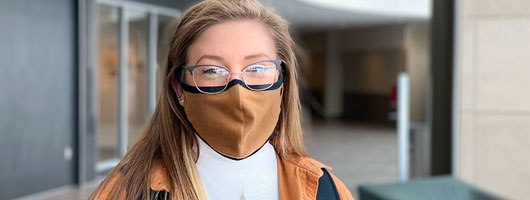 Pictured | Delaney Schavey | Rehabilitation Science | Chesterton, Indiana (hometown)
Pictured | Delaney Schavey | Rehabilitation Science | Chesterton, Indiana (hometown)
Volunteer Activities | Health Science Curriculum Committee; Mentor, Mentor Collective; PetsConnect
Bachelor of Science in Health Sciences
with a concentration in Rehabilitation Sciences
The Bachelor of Science in Health Sciences with a concentration in Rehabilitation Sciences prepares students for graduate school for various rehabilitation, exercise science, and health and fitness professions. The concentration is specifically designed for individuals seeking to apply to graduate programs in athletic training, occupational therapy and physical therapy. Students will have the ability to engage in their field of study through experiential learning with local healthcare organizations and facilities.
Rehabilitation Sciences Objectives
To be able to fulfill the requirements of a Bachelor Degree in Health Sciences with a concentration in Rehabilitation Sciences and promote the overall program goals, graduates of the Health Sciences degree at Indiana University South Bend will be able to:
- Design improvement plans for health and fitness
- Analyze aggregate exercise data to inform individuals and special populations of plans for health and fitness
- Evaluate exercise outcomes in both health and special populations
Academic Advising
Students interested in pursing graduate school after graduation should plan to meet with the advising staff early in their academic career. Most graduate schools have varying pre-requisite requirements and the Rehabilitation Sciences concentration is not intended to cover the needs of all programs. Students should be responsible for examining the admission requirements for intended graduate programs and monitor the progression along with the advising staff.
Students can schedule an appointment with an advisor through the Student Appointment Scheduler (SAS) in One.IU.
Degree Requirements (120 cr.)
Degree Map >>
Students receiving the Bachelor of Science in Health Sciences with a concentration in Rehabilitation Sciences must complete 120 credits including:
- IU South Bend Campuswide General Education Curriculum (33 cr.) to include
- ANTH-E 105 Culture and Society
Fulfills Contemporary Social Values: Global Cultures - HSC-H 102 Lifetime Wellness for Health satisfies
Fulfills Extended Literacies: Health and Wellness (3 cr.) - HSC-H 322 Epidemiology and Biostatistics
Fulfills Fundamental Literacies: Quantitative Reasoning - HSC-H 327 Introduction to Public and Community Health
Fulfills Contemporary Social Values: Diversity in United States Society - HSC-H 492 Research in Health Sciences
Fulfills Fundamental Literacies: Critical Thinking; and
Additional Requirements: Information Literacy
- Biological, Life, and Social Sciences Requirements (41 cr.)
- Major Requirements (31-32 cr.)
- Electives (balance of credits needed to equal 120 cr. requirement)
- A minimum of 30 credit hours at the 300– or 400–level.
- Courses required for the concentration are recommended to be completed with a grade of C or higher for graduate school requirements.
- A minimum CGPA of 2.0 is required.
- All courses are 3 cr., unless otherwise noted.
Biological, Life, and Social Sciences Requirements (41 cr.)
- AHLT-R 185 Medical Terminology (2 cr.)
- BIOL-L 101 Introduction to Biological Sciences I (5 cr.)
- CHEM-C 105 Principles of Chemistry I
- CHEM-C 106 Principles of Chemistry II
- CHEM-C 125 Experimental Chemistry I (2 cr.)
- CHEM-C 126 Experimental Chemistry II (2 cr.)
- MATH-M 115 Precalculus and Trigonometry (5 cr.)
- PHSL-P 261 Human Anatomy and Physiology I (4 cr.)
- PHSL-P 262 Human Anatomy and Physiology II (4 cr.)
- PHYS-P 201 General Physics 1 (5 cr.)
- PSY-P 103 General Psychology
- PSY-P 216 Life Span Developmental Pscyology
Major Requirements (46-47 cr.)
Health Sciences Core (13-14 cr.)
The Health Sciences core will begin with HSC-H Introduction to Health Sciences. This course should be taken at the beginning of the academic career along with General Education courses and select concentration-specific courses. All students in the Rehabilitation Science concentration will take 22 credit hours of core courses, but some students will take 23 based on the number of electives. Students should work with an advisor to ensure the coursework taken meets the needs of the degree requirement as well as graduate programs.
The following courses are the core courses for all Health Sciences students:
- HSC-A 291 Service Learning in Health Sciences I (1-2 cr.); OR
HSC-A 491 Service Learning in Health Sciences II (1-2 cr.) - HSC-H 101 Introduction to Health Sciences
- HSC-H 411 Psychosocial Behavior Modeling for Fitness and Health
- HSC-H 499 Senior Seminar in Health Sciences
- HSC-W 314 Ethics and Health Professionals
Rehabilitation Sciences Core (18 cr.)
- HSC-N 422 Exercise and Nutrition; OR
HSC-S 311 Strength and Conditioning Methods - HSC-S 391 Biomechanics
- HSC-S 409 Physiology of Exercise
- HSC-S 419 Fitness Assessment and Exercise Prescription
- HSC-S 420 Exercise for Special Populations
- HSC-W 211 Orientation to Health and Rehabilitation Professions
Electives (13-14 cr)
Elective courses are available for students in the Rehabilitation Science concentration and should be determined by the student and the advisor based on the desired career path. Electives are specific to career paths to support applications for graduate school. Students are responsible for ensuring the coursework completed matches the requirements of individual graduate programs which may include coursework outside of the requirements for the Health Sciences degree and the Rehabilitation Science concentration.
Recommended elective courses include:
Physical Therapy
- PHYS-P 202 General Physics 2 (5 cr.)
Occupational Therapy
- PSY-P 324 Abnormal Psychology
Athletic Training
- HSC-N 422 Exercise and Nutrition
- HSC-S 311 Strength and Conditioning Methods